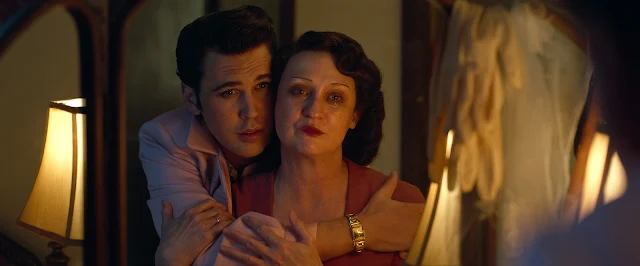Cast: Austin Butler, Tom Hanks, Olivia DeJonge, Helen Thompson, Richard Roxburgh, Kelvin Harrison Jr., David Wenham, Kodi Smit-McPhee. Screenplay: Baz Luhrmann, Sam Bromell, Craig Pearce, Jeremy Doner. Cinematography: Mandy Walker. Production design: Catherine Martin, Karen Murphy. Film editing: Jonathan Redmond, Matt Villa. Music: Elliott Wheeler.
In 2001, the two movie critics at the San Jose Mercury News both put Baz Luhrmann’s Moulin Rouge! on their end-of-the-year lists: One put it on his list of the year’s best movies, the other on his list of the worst. Something like that may happen to Luhrmann’s Elvis, which similarly divided critics into love it or hate it cohorts. But how can anyone object to the movie as “loud” or “garish,” as some do? This is Elvis Presley, for god’s sake, not the most subtle or cerebral of celebrities. And no one expected subtlety from Luhrmann, one of our most operatic directors. Elvis has its stylistic roots in Luhrmann’s love of opera, and it has to be described as Wagnerian, with Elvis as a kind of Siegfried, a naïf and demigod, and ultimately a tragic figure, undone by his trust in others. The villain of the piece, though he’s determined in his voiceover narration not to bear that label, is Col. Tom Parker, played by Tom Hanks in a performance almost smothered in prosthetics. It’s this old carny who turns Elvis’s life into a perpetual carnival. The real triumph in the film is Austin Butler’s: He manages to keep Elvis real despite all the gaudy trappings with which the self-commissioned colonel (not to mention Luhrmann) is determined to adorn him. This is not my idea of a great film, being one in which substance is fitfully allowed to co-exist with the style that threatens to overwhelm it, but it’s pretty damn good entertainment.











